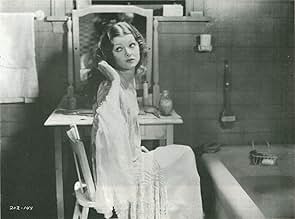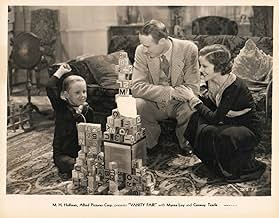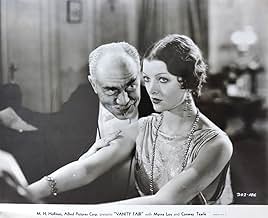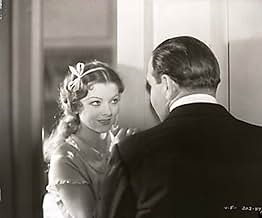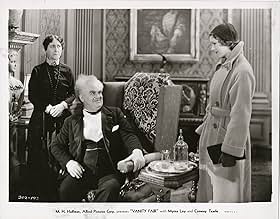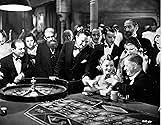Ajouter une intrigue dans votre langueThis cinematic adaptation of William Makepeace Thackeray's novel stars Myrna Loy in her first starring role.This cinematic adaptation of William Makepeace Thackeray's novel stars Myrna Loy in her first starring role.This cinematic adaptation of William Makepeace Thackeray's novel stars Myrna Loy in her first starring role.
- Réalisation
- Scénario
- Casting principal
Ray Culley
- Casino patron
- (non crédité)
Bill Elliott
- Minor Role
- (non crédité)
Tom Ricketts
- Sir Pitt's Butler Parker
- (non crédité)
Avis à la une
I bought this DVD as part of a set of 50 "historic classics." It's hardly a classic, and as the plot was updated to the time of its release, is not historic either. The actual title on the DVD is "Indecent," and additionally subtitled "The Private Life of Becky Sharp." Myrna Loy is not very convincing, although in her defense she is saddled with an awful script and trite dialogue. As with many early talkies, and especially ones made by smaller studios, there is little skill demonstrated by the cast and crew. Loy does wear a few gowns that are quite stylish, but her costumes and make-up in the later scenes are overdone. The one saving grace is a tolerable performance by Billy Bevan, who plays one of her many suitors
I love the Thackeray novel on which this film is based. And while this modern version of Becky Sharp's story is a B film, the casting of Loy, in her first top-billed role, is rather fascinating.
Before Loy became MGM's reigning good girl in scores of genteel and comic roles, she was an actress. VANITY FAIR was Loy's follow-up film to EMMA, in which she played a snotty and greedy daughter who almost destroys the loyal housekeeper (Marie Dressler).
Loy's Becky is much nastier than Miriam Hopkins' version 3 years later in BECKY SHARP. Loy's Becky is very much a pre-Code film character with her plunging necklines and amoral ways. It's the type of character that Jean Harlow or Clara Bow could easily have played, but Becky here is still supposed to be of the genteel set. That's what makes her fallen character so tragic.
In counterpoint to Loy's grasping Becky is the goody goody Amelia (Barbara Kent) who is just not an interesting character. Mary Forbes is icily good as Mrs. Sedley. Most of the other actors in this version are pretty blah: Conway Tearle as Rawdon; Walter Byron as Osborne; Anthony Bushell as Dobbin. Others are nearly Dickensian is their quirkiness: Billy Bevan as Joseph; Lionel Belmore as Crawley; Montagu Love as the Marquis; Lilyan Irene as Polly the maid; Elspeth Dudgeon as the housekeeper.
Loy is front and center throughout. While the ending is rather shocking, she has several excellent scenes, such as the gambling scene in the casino where she tries to steal another woman's winning roulette bet. The more Loy's Becky descends morally, the more beautiful she gets until she is finally "caught." Bottom line here is that this is a very solid performance by Loy in a film that should be seen.
Before Loy became MGM's reigning good girl in scores of genteel and comic roles, she was an actress. VANITY FAIR was Loy's follow-up film to EMMA, in which she played a snotty and greedy daughter who almost destroys the loyal housekeeper (Marie Dressler).
Loy's Becky is much nastier than Miriam Hopkins' version 3 years later in BECKY SHARP. Loy's Becky is very much a pre-Code film character with her plunging necklines and amoral ways. It's the type of character that Jean Harlow or Clara Bow could easily have played, but Becky here is still supposed to be of the genteel set. That's what makes her fallen character so tragic.
In counterpoint to Loy's grasping Becky is the goody goody Amelia (Barbara Kent) who is just not an interesting character. Mary Forbes is icily good as Mrs. Sedley. Most of the other actors in this version are pretty blah: Conway Tearle as Rawdon; Walter Byron as Osborne; Anthony Bushell as Dobbin. Others are nearly Dickensian is their quirkiness: Billy Bevan as Joseph; Lionel Belmore as Crawley; Montagu Love as the Marquis; Lilyan Irene as Polly the maid; Elspeth Dudgeon as the housekeeper.
Loy is front and center throughout. While the ending is rather shocking, she has several excellent scenes, such as the gambling scene in the casino where she tries to steal another woman's winning roulette bet. The more Loy's Becky descends morally, the more beautiful she gets until she is finally "caught." Bottom line here is that this is a very solid performance by Loy in a film that should be seen.
You know I'm willing to bet that Myrna Loy was excited that she would get to do a film version of Thackery's Vanity Fair. But she lost her enthusiasm upon finding it was for a poverty row outfit called Allied Pictures. God only knows whether Louis B. Mayer owed something to producer Chester Franklin or Myrna Loy committed some transgression that caused her to be punished.
With the usual MGM productions values and had they kept it in the mid Victorian era it was written, Vanity Fair might have turned out to be a classic film. But it was a poverty row production set during the Jazz Age of the 20s. Where in the United Kingdom it wasn't all that different from us except they were smart enough not to put in Prohibition.
Barbara Kent brings school girl chum Myrna Loy home for the holidays. Myrna is an orphan who once she tastes some of the good life that Kent's family enjoys she's going to have it whatever the cost. The film is a lot like the Barbara Stanwyck classic Baby Face except Baby Face is far less pretentious.
Thackery's writing was of Victorian times and it just didn't make sense for the Roaring 20s. Myrna had a lost look and I'm sure she was grateful to finish the film and get back to MGM.
What could she have done to deserve this?
With the usual MGM productions values and had they kept it in the mid Victorian era it was written, Vanity Fair might have turned out to be a classic film. But it was a poverty row production set during the Jazz Age of the 20s. Where in the United Kingdom it wasn't all that different from us except they were smart enough not to put in Prohibition.
Barbara Kent brings school girl chum Myrna Loy home for the holidays. Myrna is an orphan who once she tastes some of the good life that Kent's family enjoys she's going to have it whatever the cost. The film is a lot like the Barbara Stanwyck classic Baby Face except Baby Face is far less pretentious.
Thackery's writing was of Victorian times and it just didn't make sense for the Roaring 20s. Myrna had a lost look and I'm sure she was grateful to finish the film and get back to MGM.
What could she have done to deserve this?
Rather affecting little morality flick adapted from the classic novel of same name. Wow, Becky Sharp is one sharp looking cookie. As Becky, Loy turns every rich guys head into a hormonal surge. Trouble is she's got no moral principles that might guide her into something other than a mercenary direction. As a result, she looks to fleece potential suitors just for her own benefit. Still, she's having trouble sorting through the wealthy pursuers, who are a crowded lot. At the same time, her mis-judgements and maybe cosmic fate keep getting in the way.
Loy's perfect in her first starring role, big eyed, statuesque, and nicely modulated in her coyness. In fact, it cleverly takes a while to figure out she really is a gold-digger and not just an attention-getter. Then too, I love the way she never answers a bedroom door except in her robe-less nightgown. No wonder the guys keep coming. But Loy's real performance triumph is not making Becky dislikable despite her unremitting selfishness. To me, that helps make the movie watchable. But don't look to the storyline for action or real suspense. Rather, the plot hinges on character and what the goldigger's outcome will be. Then too, I found the climax rather surprising, but then it is 1932 while censorship is still two-years away.
Anyway, for fans of Loy, it's a showcase, while for movie fans, the 60-minutes is surprisingly contemporary in its dealings.
Loy's perfect in her first starring role, big eyed, statuesque, and nicely modulated in her coyness. In fact, it cleverly takes a while to figure out she really is a gold-digger and not just an attention-getter. Then too, I love the way she never answers a bedroom door except in her robe-less nightgown. No wonder the guys keep coming. But Loy's real performance triumph is not making Becky dislikable despite her unremitting selfishness. To me, that helps make the movie watchable. But don't look to the storyline for action or real suspense. Rather, the plot hinges on character and what the goldigger's outcome will be. Then too, I found the climax rather surprising, but then it is 1932 while censorship is still two-years away.
Anyway, for fans of Loy, it's a showcase, while for movie fans, the 60-minutes is surprisingly contemporary in its dealings.
Myrna Loy is cast as Becky Sharp, and this appears to be her first starring role, a step away from the exotic vampires she played earlier in her career (such roles would continue through 1934, even after her breakthrough role in THE THIN MAN), but it would be Frank Capra and W.S. Van Dyke who would reimagine her as what she was: a great American beauty.
Miss Loy was lent from MGM to M.H. Hoffman at Chesterfield for this modern-dress version of Thackeray's novel, and despite the cheapness of the production and the wonky soundtrack on the copy I saw, director Chester Franklin's desire to make a serious version of the story about the girl who knew men only wanted her for one thing, and she was going to make them pay for it, shines through. The casting includes some good silent movie talent, including Conway Tearle as Rawdon Crawley, able to support a leading lady without distracting the audience; Lionel Belmore as his lascivious father;Barbara Kent as her friend, Amanda Sedley.
It's a nice version, and undoubtedly was a turning point in Miss Loy's career. Unfortunately, Franklin's polite and family-friendly handling failed to ignite any major response in a year when movie grosses and profits were at a low point; and the sumptuous Technicolor version of 1935 all but erased this movie from the public consciousness.
Miss Loy was lent from MGM to M.H. Hoffman at Chesterfield for this modern-dress version of Thackeray's novel, and despite the cheapness of the production and the wonky soundtrack on the copy I saw, director Chester Franklin's desire to make a serious version of the story about the girl who knew men only wanted her for one thing, and she was going to make them pay for it, shines through. The casting includes some good silent movie talent, including Conway Tearle as Rawdon Crawley, able to support a leading lady without distracting the audience; Lionel Belmore as his lascivious father;Barbara Kent as her friend, Amanda Sedley.
It's a nice version, and undoubtedly was a turning point in Miss Loy's career. Unfortunately, Franklin's polite and family-friendly handling failed to ignite any major response in a year when movie grosses and profits were at a low point; and the sumptuous Technicolor version of 1935 all but erased this movie from the public consciousness.
Le saviez-vous
- AnecdotesShot in ten days.
- Citations
Joseph Sedley: Ever been to Brighton?
Becky Sharp: Brighton? No, never.
Joseph Sedley: How would you like to come with me for a weekend?
[lecherous wink]
Joseph Sedley: Lovely place. Lots of fun. Lots of champagne.
- ConnexionsReferenced in Hollywood Hist-o-Rama: Myrna Loy (1961)
Meilleurs choix
Connectez-vous pour évaluer et suivre la liste de favoris afin de recevoir des recommandations personnalisées
Détails
- Durée1 heure 18 minutes
- Couleur
- Rapport de forme
- 1.37 : 1
Contribuer à cette page
Suggérer une modification ou ajouter du contenu manquant

Lacune principale
By what name was Vanity Fair (1932) officially released in India in English?
Répondre
